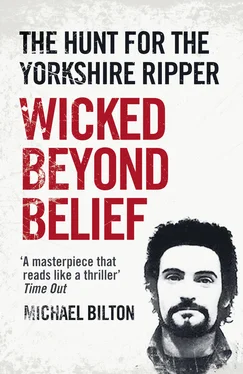However, a massive investigation by one police force into four unsolved murders by the same person had its price. Manpower was stretched, and with it came a rising bill for police overtime. With the costs mounting, Gregory consulted with his local police authority and so ensured that the necessary financial resources to solve the killings were found from within the West Yorkshire Police budget. But it was also clear that something more had to be done for the public to continue to have confidence in their local police service.
De facto, the buck in 1977 stopped at George Oldfield’s first-floor office as assistant chief constable in charge of crime at the Wakefield HQ. For a year he had followed the normal procedure of handing day-to-day responsibility for each individual murder inquiry to the various senior investigating officers. In 1977, as the number of incidents involving the Ripper increased dramatically, there were sensational headlines and public disquiet. How Oldfield dealt with the pressures of the case became the source of considerable controversy over the years. That his response was to overwork himself, drink too heavily and habitually smoke his Craven A cigarettes, was undeniable. The mode of life led eventually to him having two heart attacks.
Later the spotlight would fall on Oldfield’s judgement calls. His management of twentieth-century Britain’s most important criminal investigation became the subject of unique official scrutiny. After a five-year killing spree by the Yorkshire Ripper, the failure to capture him became a national scandal and a group of Britain’s most senior detectives descended on West Yorkshire police. Their orders from the very top of the Home Office were to ‘Sort out what is going wrong’. This unprecedented move came after an outraged Margaret Thatcher herself told the Home Secretary that she was inclined to take personal charge of the Ripper inquiry.
But no one could accuse George Oldfield of being either lazy, uncommitted or a fool. He was typical of many who held similar jobs up and down Britain. He knew about crime, serious crime, and he was a good thief taker. Taking over as ACC (crime) from Donald Craig meant he had a lot to live up to. His predecessor had investigated seventy-three murders and solved every one. It had been Oldfield’s ambition, according to his wife, to become head of CID, and now he was in the hot seat. He had learned the art of mastering internal politics. Indeed, he could never have risen to assistant chief constable had he not understood the value of discretion or been in the habit of making enemies among the force hierarchy. There was, however, a persistent rumour among the higher echelons of the force’s CID that, when offered the job of ACC (crime), he had been warned he had to cut down on his drinking.
Professionally he was an enthusiastically hard worker who took his job very seriously and demanded an equally determined effort from subordinates. Though undoubtedly a leader at local level, he lacked the sophisticated knowledge and intellectually rigorous mind necessary to employ innovative procedures to break the deadlock confronting him. Normally a soft-spoken man, in the latter years of his career he could be mistaken for a country farmer. Rough shooting was his favourite pastime. He presented a bucolic appearance typical among those brought up in rural areas who have improved their station in life. He wore on occasions country tweeds, and his round face and cheeks bore the ruddy features of someone who liked the outdoor life and knew a good quality whisky when he drank it. However easygoing he was at home, his outbursts of temper at work were legendary, though not necessarily understood. He was essentially a private man, rarely speaking about his family, preferring to keep home and professional life separate. When riled by something or someone at work his anger could turn to fury in an instant. He could swear like a trooper, yet he was never one to hold grudges. Once an admonishment was delivered, so far as he was concerned it was over and dealt with, though those who worked for him frequently remembered it for years.
‘He could go bloody mad when he was angry,’ a close colleague and admirer remembered. ‘He would use abusive language and then it was all forgotten. You had had your bollocking. The next job you did for him, you were just as likely to get a pat on the back. Some of the other senior officers bore you malice; if you had dropped a clanger it was with you for life, but it wasn’t so with him.’
Oldfield ran a tight ship. He wanted to know about serious crime when it happened within the force area. A divisional detective chief inspector was expected to let Oldfield have information quickly, rather than keep him in the dark. ‘We had to ring in, he never objected to being told about something at three in the morning,’ said the same officer, who worked closely with Oldfield over many years. ‘He was quite happy, once he got to know you and how you worked, to leave a serious job that happened during the night to you. But you had to contact him before 8.55 the following morning. This was so he had the story when he was asked by the chief constable about it and when the headquarters press conference took place. If ever something came up at either of those two meetings, which he had every morning, without him having been told, you got the mother and father of a bollocking. If it happened a few times, you didn’t keep your job.’
He was born Godfrey Alexander Oldfield in 1924 and grew up in that area of eastern Yorkshire where the terrain of flat, featureless pastureland is strikingly similar to Holland and the Low Countries. He lived in his early years with his brothers, who were twins, amid the farming community on the far eastern fringes of what was then the West Riding at Monk Fryston, a small village tucked away out on its own a few miles from Castleford. His grandfather was the local blacksmith. Like many villages in those days it still had a working windmill where flour was produced. The surrounding farmland hardly rose more than twenty feet above sea level all the way to the Yorkshire Wolds.
Oldfield’s father worked for the LNER (the London and North Eastern Railway). When he was eleven the family moved several miles across the Vale of York to Cawood, where his father became local station master. It was another closely knit rural community, more a small town than a village, but it had its own branch line to the inland port of Selby five miles away. The line halted at Cawood, which had grown in importance historically because of its proximity to the River Ouse, in whose flood plain it lay. Its swing bridge provided the last crossing point on the navigable River Ouse before the ancient City of York ten miles away. Several other rivers fed the Ouse on its journey via the Humber to the North Sea forty miles distant. Formerly Cawood was one of the chief residences of the Archbishop of York, who had a fortified palace-cum-castle built there, and frequently the royal court moved there from Windsor. It was the place where Cardinal Wolsey was arrested and charged with high treason.
The move coincided with Oldfield attending one of Yorkshire’s top boys’ grammar schools, Archbishop Holgate’s in York, where he became known as ‘George’. Indeed, he insisted on the name being used because of his intense dislike of being called Godfrey. The family never used it. At home, and to his future wife, Margaret, who also lived in Cawood, he was always called ‘Goff’.
After leaving grammar school he worked briefly at Naburn Station, just outside York, on the LNER route from London to Edinburgh. His first exposure to iron discipline came as a young naval seaman during the Second World War after he joined the Royal Navy, aged eighteen, in 1942. He hardly ever talked to his family of his war service, either after he got home in 1946 or in later years. He came from that generation of stoical men made brittle by the experience of war who preferred to keep to themselves the awful truth of what they had personally witnessed rather than burden those closest to them.
Читать дальше












